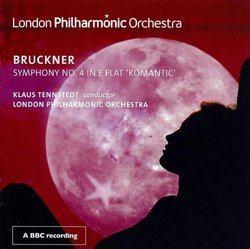| All Artists: Anton Bruckner, Klaus Tennstedt, London Philharmonic Orchestra Title: Bruckner: Symphony No. 4 Members Wishing: 0 Total Copies: 0 Label: LONDON PHILHARMONIC Original Release Date: 1/1/2006 Re-Release Date: 9/26/2006 Genre: Classical Style: Symphonies Number of Discs: 1 SwapaCD Credits: 1 UPC: 854990001147 |
Search - Anton Bruckner, Klaus Tennstedt, London Philharmonic Orchestra :: Bruckner: Symphony No. 4
 | Anton Bruckner, Klaus Tennstedt, London Philharmonic Orchestra Bruckner: Symphony No. 4 Genre: Classical
|
Larger Image |
CD Details |
CD ReviewsA great Bruckner conductor at his best Santa Fe Listener | Santa Fe, NM USA | 11/19/2006 (5 out of 5 stars) "I'm embarrassed to offer a review after reading Mr. Morrison's cogent, sensitive reaction to this live Bruckner Fourth from Tennstedt and the LPO. It's shocking to me that The Gramphone, reviewing Tennstedt's live Bruckner Third on Profil, which is equally thrilling and imaginative, dismissed the performance as no better than a sloppy run-through. I guess Tennstedt's free hand with rubato and his (relative) lack of interest in perfect ensemble bother some critics. So be it. My only quibble is that the Scherzo feels rushed as Tennstedt paces it. Even so, this 1989 Bruckner Fourth is full of both drama and rapture; it captures the mystery of Bruckner's aesthetic more palpably than any other recording I've heard, and from now on Karajan, Klemperer, and Harnoncourt, my benchmarks in this great symphony, will have to move aside. Highly recommended." Tennstedt's Hot-Blooded Bruckner J Scott Morrison | Middlebury VT, USA | 10/22/2006 (5 out of 5 stars) "Klaus Tennstedt (1926-1998) labored in relative obscurity in East Germany until he made his debut in the West in 1971. It didn't take long for his reputation to rocket upward and he was soon conducting all over the world. His star rose in spite of his ungainliness -- he was once described as looking like a 'demented stork' on the podium -- because of his intense and passionate music-making. He formed a close relationship with the orchestra on this CD, the London Philharmonic, and was its music director from 1983 until his health failed. This recording (of the 1886 Haas edition) was made from a live performance in Royal Festival Hall in 1989. He had made a specialty of the Bruckner symphonies (along with those of Beethoven and Mahler) and it was the Fourth that he conducted most often. Unlike many Bruckner specialists he led performances of that composer's works that were not constrained by the metronomic and 'correct' approach. He molded phrasing and dynamic variations that seemed on close inspection to change with almost every bar while emphasizing the almost dancelike rhythmic vitality and the fluidly lyrical line. Yet, there was never any sense of the music being pulled like taffy; there was, in spite of the work's length, a sense of the music's architectural grandeur being demonstrated in exquisite detail. The music sounded organic and, most of all, passionate and even almost Italianate. And that is certainly the effect of this marvelous performance recorded here. In spite of a few minor bobbles from the orchestra, inevitable in live performance, this is a great recording of what is possibly the most recorded of Bruckner's symphonies.
From the opening horn solo (played like an angel by Nicholas Busch, the LPO's principal horn) to the rounding out of the symphony's organic thematic construction at the end of the finale some seventy minutes later, there is a sense of inevitability to the performance, and yet there are surprises along the way that seem, for all their unexpectedness, to be completely right. One of Bruckner's characteristics is that he goes on at great length, and in the wrong hands this can seem longwinded pomposity; in Tennstedt's performance here Bruckner seems to be saying, 'I have a few more things to say that I think you'll find illuminating', and you do. Most of all, though, Tennstedt seems to have the ability, as compared to some, to widen Bruckner's expressive range. His efforts are expressed, of course, through the playing of the London Philharmonic and I must say that the orchestra was, on this particular evening, at the very top of their game. They achieve the rapture called for in, say, the Andante or the finale, but are capable of apocalyptic fortissimos when required. In Bruckner's Fourth there is danger than the brass can become blatty and tiresome; not so here -- the brass are fully integrated into an organic whole with a round, full, immaculately tuned sound. The third movement in particular demonstrates this quality. The lower strings and brass are never, as in some performances, sluggishly heavy-footed but somehow manage to sing throughout. There is a luster and velvety richness to the strings as a whole when they are playing chordal passages, as in the final movement. Bruckner does not write particularly sympathetically for the winds, but the LPO's winds make the most of their opportunities. Make no mistake, this is an incandescent performance, made all the more so by its being a live performance for an attentive audience (whose presence is betrayed only by the rapturous applause at the symphony's conclusion). This is one of the great ones. Scott Morrison" |

 Track Listings (4) - Disc #1
Track Listings (4) - Disc #1